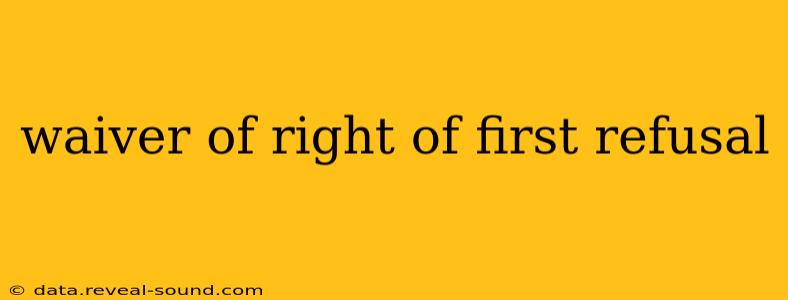A Right of First Refusal (ROFR) grants a party the exclusive opportunity to purchase or lease a property or asset before it's offered to others. However, circumstances often arise where this right needs to be relinquished. This guide delves into the intricacies of a waiver of right of first refusal, explaining what it is, why it's necessary, and how it's executed.
What is a Waiver of Right of First Refusal?
A waiver of right of first refusal is a legal document where the party holding the ROFR voluntarily gives up their right to purchase or lease the subject property or asset before anyone else. This effectively removes their priority claim and allows the owner to proceed with a sale or lease to a third party. This waiver is a legally binding agreement and should be carefully drafted to avoid future disputes.
Why Would Someone Waive Their Right of First Refusal?
Several reasons might prompt someone to waive their ROFR:
- Unfavorable Market Conditions: The market value of the property might have declined, making the purchase less attractive.
- Financial Constraints: The holder of the ROFR might lack the necessary funding to exercise their right.
- Changed Circumstances: The holder's personal or business circumstances might have altered, making the acquisition impractical or undesirable.
- Better Opportunity: The holder might have identified a more lucrative investment opportunity elsewhere.
- Relationship Breakdown: If the ROFR was granted within a business partnership or personal relationship that has soured, waiving the right might be part of a broader settlement.
- Strategic Decision: In some business contexts, waiving the ROFR might be a strategic move to foster better relations with the property owner or other stakeholders.
How is a Waiver of Right of First Refusal Executed?
A waiver of right of first refusal should be a formal written document. It typically includes:
- Identification of Parties: Clearly identifies the owner of the property and the holder of the ROFR.
- Specific Property Description: Provides a precise description of the property or asset subject to the ROFR.
- Clear Statement of Waiver: Unambiguously states that the holder is waiving their ROFR.
- Consideration (if any): Specifies any payment or other consideration received by the holder in exchange for the waiver. This isn't always necessary, but it is often advisable.
- Effective Date: States the date the waiver becomes effective.
- Signatures: Requires signatures from all parties involved.
It's crucial to have legal counsel review and draft the waiver to ensure it's legally sound and protects the interests of all parties.
What Happens After a Waiver of Right of First Refusal?
Once the waiver is signed and effective, the owner is free to sell or lease the property to any party without needing to first offer it to the holder of the original ROFR. The holder loses all priority claims concerning that specific property or asset.
People Also Ask (PAA) Questions and Answers:
What is the difference between a right of first refusal and a right of preemption?
While often used interchangeably, there's a subtle difference. A right of first refusal gives the holder the right to match an offer from a third party. A right of preemption gives the holder the option to buy the property at a predetermined price or at fair market value before it's offered to others. The right of preemption often gives the holder more control.
Can a right of first refusal be revoked?
Generally, a properly executed ROFR cannot be unilaterally revoked by the grantor (the owner of the property). However, it can be waived by the holder (the party possessing the ROFR), as described above. The terms of the original ROFR agreement will dictate the specific conditions under which it can be modified or terminated.
Is a waiver of right of first refusal legally binding?
Yes, a properly executed waiver of right of first refusal is a legally binding contract. Breaking the terms of the waiver can result in legal consequences, including potential lawsuits and financial penalties. This emphasizes the importance of having legal counsel involved in the process.
Do I need a lawyer to waive my right of first refusal?
While not strictly mandatory in all jurisdictions, it's highly recommended to seek legal advice before waiving a right of first refusal. A lawyer can help ensure the waiver document is properly drafted, protecting your interests and avoiding potential future disputes.
This comprehensive guide provides a solid understanding of waivers of the right of first refusal. However, remember that legal situations are complex and specific to individual circumstances. Always seek professional legal advice for guidance on your particular situation.
